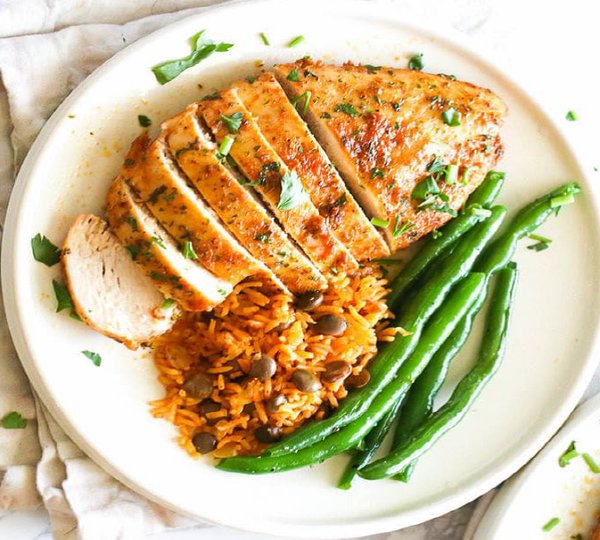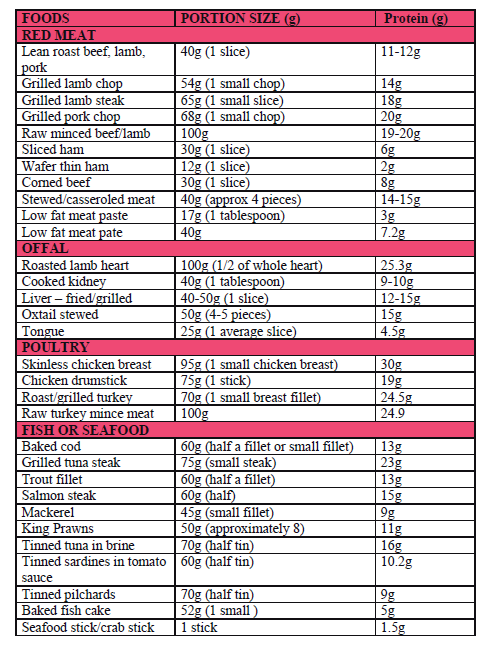Protein after Bariatric Surgery
This information booklet is designed to provide you with more understanding in importance of protein rich foods in your diet after bariatric surgery.
Why is protein important to have in my diet?
Protein is important as it is:
- Essential building-block for the body
- Necessary for growth and repair
- Important in helping to fight infections.
After bariatric surgery, it is important to have a protein rich food at each meal time.
Ideally you should aim to have 70-100 grams of protein a day.
Good sources of protein include:
- Red meat, poultry, fish
- Eggs
- Beans and pulses
- Dairy foods (e.g. milk, cheese, yoghurt)
- Non-dairy alternatives (eg. soya based dairy, lacto free)
- Tofu and Quorn
These foods are also good sources of some essential vitamins and minerals.
- Vitamins A, B, and D
- Minerals: Iron and Zinc
Top Tips:
- Plan your menu in advance; base your meals and snacks around foods that are high in protein.
- Choose low-fat varieties or lean meat; cut any visible fat off. Avoid adding fat when cooking these foods.
- Chew meat, chicken and fish well before you swallow to avoid it getting stuck.
- Eat slowly.
- You may find roasted meats more difficult to tolerate. If this is the case then you may find alternative ways to cook meats which may be easier, for example, stewed meats, casseroled meats, slow cooked meat, minced meat, and wafer thin meats.
“Aim to eat protein rich food of your meal first”

- EAT FIRST: Protein (meat, fish, poultry, eggs, beans, pulses)
- EAT SECOND: Vegetables and salad
- EAT LAST: Carbohydrates (bread, rice, potato, pasta, grains)
Amount of protein in foods
The following tables show the amount of protein per potion in detail.




Protein supplementaion and Bariatric Surgery
After bariatric surgery it can be difficult to meet your requirements for protein as food intake is very small. You need adequate protein as your ability to absorb protein is not as efficient as it was before surgery.
- Protein is essential for your body to heal and maintain muscle mass whilst you are losing weight.
- Ideally we would like you to aim to include at least 70g of protein in your diet each day.
Using a protein supplement can be a useful way to achieve this particularly in the first 6 months following your operation.
The ideal protein supplements are made from dairy protein (whey or casein protein), egg white protein, or soya protein. These are the most readily absorbed by your body and contain complete protein. A complete protein (or whole protein) is a source of protein that contains all 9 of the essential amino acids that are necessary to meet the dietary needs of humans in the correct proportions to support the functioning of the human body.
Below are some example protein supplements available that are low in calories, carbohydrate and fat, but high in protein. You may find others on the market; look for one that contains the least amount of calories for the most protein.
Whey protein powder is the most readily available protein supplement and can be found in many supermarkets and health food stores. Ideally they should be made with skimmed milk as it will further increase the protein content for the same volume of fluid.
Food Fortification
- Skimmed Milk Powder

Added into milk, this can be a useful tool in helping increase protein intake and be a cheaper alternative to protein shakes.
For example: 1 pint skimmed milk + 4 tablespoons of skimmed milk powder = 40g protein.
It can also be used in soups and other recipes.
- Sanatogen High Protein Powder (casein)

Flavourless powder to add into milk or food e.g. soups / stews / porridge.
Per 2 teaspoons = 5.5g protein
Effective way to add protein value of food without influencing flavour.
High protein yogurts



High protein supplements



Protein Powders



Alternatives

Protein bars (suitable for regular diet phase onwards only)

Protein Bites (suitable for those that can’t tolerate the drinks)

Protein challenge 70-100g daily

Example of a meal plan:


